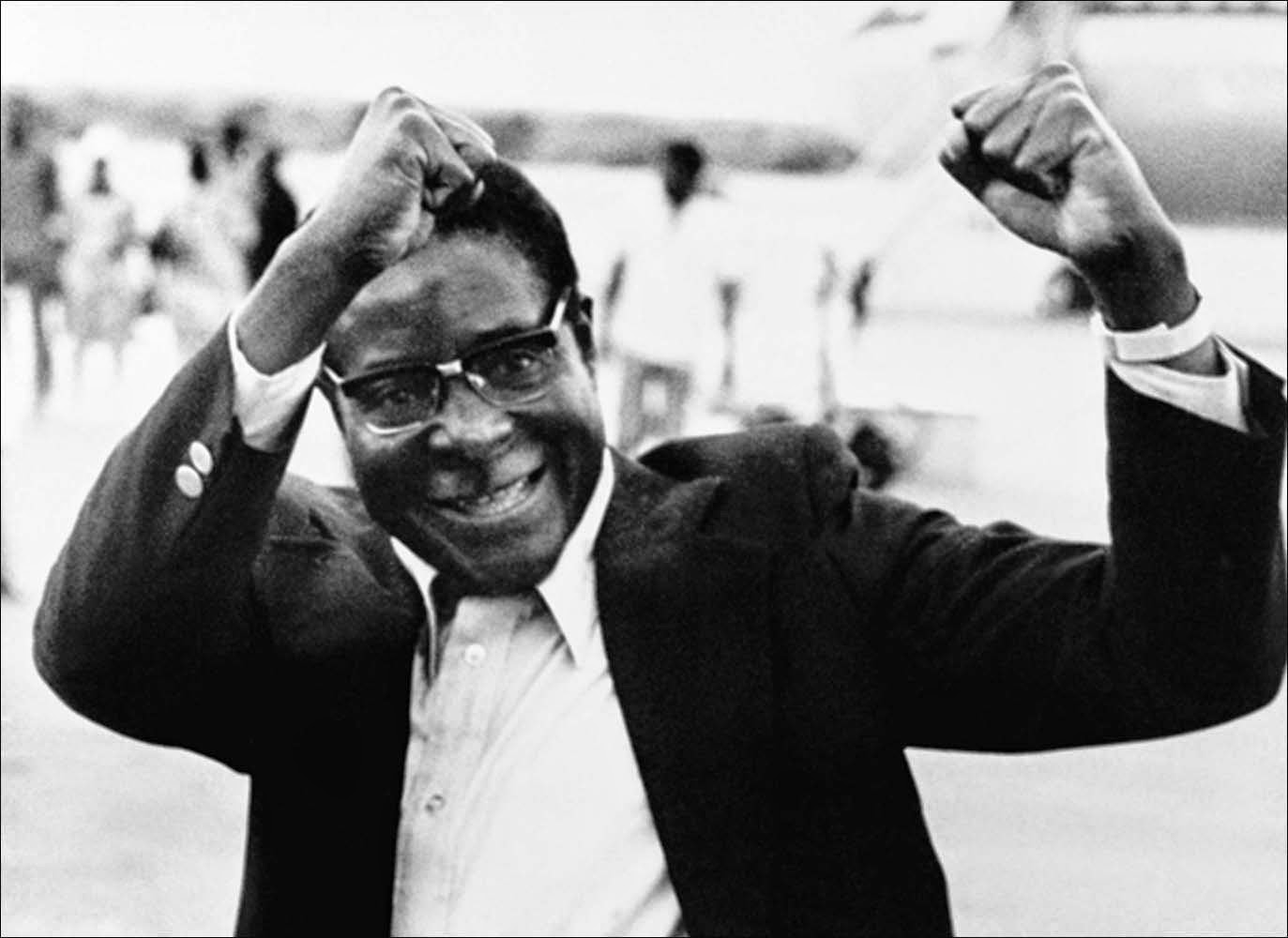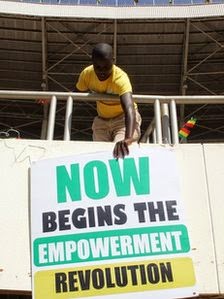By Bernard Bwoni
 |
ZANU PF UK Vice Secretary General:
Cde Bernard Bwoni |
It is well and fine to create your own little green
space, a little paradise for yourself and an oasis in the middle of raging
waters but the fact of the matter is that your individual comfort will always
be under threat from collective misery. The Rhodesians did it until cumulative
deprivation of the majority dismantled the biased construct. It is better to
create a comfortable space for collective benefit, a place of aesthetics and
beauty, a place for everyone to enjoy and be prepared to defend for continued
aggregate benefit. The government of Zimbabwe has been proactive and
progressive in laying the foundations for the country’s reorganisation
following years of external and internal obstructions. The focus has been
people-centred policies and that is policies for undivided societal gains. That
is the key to silencing all those perennial naysayers of government and
government policy through effective implementation and delivery.
Professor
Jonathan Moyo was on point when he recently stressed the importance of service
delivery and implementing the objectives of ZIMASSET as the key to countering
those who had been working clandestinely and in cohort with external elements to
unconstitutionally unseat President Mugabe. That is the only way to upgrade the
lives of the ordinary citizens of Zimbabwe and rebuffing those who have been
working tirelessly to derail Zimbabwe’s economic revolution. Zimbabwe under the
astute stewardship of President Mugabe has weathered the storm and there is
clear awareness that the only defence against such attacks and the surest way
towards another landslide victory in 2018 is through good public services in
place for people.
The government has continued prioritising civic
services, welfare services, human development services and provision of basic
minimum services amid very difficult micro and macroeconomic conditions. This
is not rocket science; the people of Zimbabwe have been embracing government
initiatives because they seek to empower and ameliorate citizens’ lives. The
priority has been clean, constant and consistent water supplies, improved
sanitation and roads rehabilitation. New pumps were recently installed at the
Morton Jaffray Water Treatment and most are beginning to feel the benefits of
such service delivery initiatives. Amid the never ending negative onslaught the
government has continued to have that bona fide raison d’être to the welfare of
the people and the development of Zimbabwe through public service delivery. The
paper that ZIMASSET is written on has to translate into tangible activity on
the ground for the benefit of ordinary men and women on the street. Hence the
urgent need to harness and involve all stakeholders and the starting point
should be the development of partnerships, mobilisation of all civil society
groups, the realignment of the frustrating bureaucratic bottlenecks and the use
of ICT as a potential tool for effective public service delivery.

There has been a people-centred service delivery
approach where the new relationship between the government and the citizens has
become that of provider and recipient of the public service. The 2018 election
is safely in the bag once these service delivery strategies go into full swing
and people have a clear awareness of their existence. There is need for
education and information on these initiatives. The government doing a lot of
hard ground work in terms of infrastructure development and delivery of
services yet there is a lack of clarity on such and citizens continue to lament
the lack of such because of lack of information.
There are many developments
happening in Zimbabwe as we speak but unfortunately these have not been
effectively and clearly presented to the public. The citizens of Zimbabwe have
basic rights to expect to receive high quality public services and the
government of Zimbabwe does listen to the people on a broad scale, but there is
need for the authorities to start narrowing it down to the barebones of people-centred.
It has to start with listening to the people and modifying services accordingly
to the needs of the people. The government as the service provider acts as
trouble-shooters and should effectively and timely respond to complaints and
continually seek feedback and evaluate own strategies for service provision to
continually improve the service being provided. The citizens of Zimbabwe have
to be involved in the monitoring process and these are nitty-gritty’s of
effective public service delivery.
There are some unsustainable inequalities in the
country as a whole and a good example is the divide between the northern and
southern, low density and high density residential locations which existed
before independence and still persist today. The low density areas seem to
enjoy way better services than their high density counterparts who are mostly
densely populated and thus in more urgent need of services. If you travel
around Glen Lorne, Greendale, Mount Pleasant, Borrowdale and others you find
the roads are in better shape than Mbare, Mufakose, Glen Norah, Tafara,
Budiriro and others. The low density areas are generally cleaner and there is
less dumping in public spaces. The government should thus focus on the poor and
disadvantaged citizens to the extent of affirmative action and positive
discrimination in terms of service delivery in favour of those previously and
perpetually marginalised groups. There is need for conscious and deliberately
planned outreach to target the more disadvantaged in the cities and rural
areas.
The provision of basic services is recognised
within the Zimbabwe Constitution and this should be built around high standards
of integrity in the country's institutions. There is need for better and clear
information dissemination and the strengthening of the country's public
institutions. Weak public institutions will yield poor public services. What
Professor Moyo was alluding to is that the continuous improvement of methods,
processes and standards of high quality service delivery should form part of
the ruling party's election campaign. This is no longer about saying what
people want to hear a few weeks before the elections but actually focusing on
what people need in the long run. This is about incorporating service delivery
into the day to day running of government. Street lighting should be working
uninterrupted unless it is forces of nature, roads should be constructed and
maintained, potholes addressed on an ongoing basis, clean and consistent
running water, hospitals working at normal capacity, good and affordable
schools and support for those who are unemployed. The government has to be
commended for tackling some of those niggling public service delivery issues
under the tight fiscal constraints.
The ruling party has the tools and strategies in
place and has started putting these into practice. The emphasis should be on
simplification of rules, reducing redundant multifaceted levels of decision
making and greater delegation of authority to the levels that actually deliver
on the ground. The result based management system should be implemented fully
and there should be follow-up right down to the bottom end of the structure.
The buck stops with the senior management and if there is a dislocation in
terms of service delivery then the management is not fit for purpose and in
need of replacement. The senior management in service delivery has to be
accountable to both government and citizens of Zimbabwe. They should be
emphasising capacity building to upgrade skills, to change attitudes and
improve performance. The idea is to first and foremost reduce or remove
completely the bottlenecks and bureaucracies, reduce waiting times, simplify
forms and processes, provide information and make it easier for citizens to get
that information, create hotlines for service delivery and complaints or
compliments.

The senior management should be offloading
unhelpful and unfriendly personnel to ensure that service is delivered
according to promises made, that waiting times are as short as possible. The classic
case of poor service delivery in Zimbabwe is the installation of electricity in
newly built dwellings. It takes forever get electricity into your home unless
if a bribe is paid. This is a basic right of every citizen of Zimbabwe to have
electricity but the power companies make the lives of citizens unbearable. The
red tape, the bribery and lack of transparency and accountability in certain
institutions has eroded the trust citizens have in government ability to
deliver good quality services.
Any incremental improvement in public services will
positively impact on many citizens and that translate to even more votes in
2018. Innovation and continuous improvement are the hallmarks of sustainable
public sector transformation and the country is beginning to see some of the
benefits. There is need to reshape public services to make them more flexible,
responsive to the needs of the people and more effective by removing
unnecessary red tape and duplication in planning and delivery. The complex and
confusing landscape of the corrupt and inefficient public sector organisations
has to be simplified and make for easy access to services for all.
The government should terminate any activities that
have stopped contributing to the public purpose, remove all organisational
barriers detrimental to service delivery, simplify structures to streamline
decision making and increase transparency. Service delivery costs money, we are
talking of money the government does not really have and as such should remain
frugal. Government should look into bringing together organisations with
similar skills, expertise and processes to achieve greater effectiveness,
economies of scale and removal of duplicated functions and powers. And after
that 2018 is yet another walk in the park.
#Bhora mberi ne service delivery#
--------------------------------------------------------------------------------------------------
 A visionary does not get old. He gets better. For when the
physical vision begins to fail. When those eyes begin to give then the mind
begins to see more. Because vision is the art to see the invisible. It is the
gift to see what nobody else can see. The sense of perception is only heightened when the distractions of the
physical gets blinded. Visions become
focussed when we stop to look outside and begin to look inside.
A visionary does not get old. He gets better. For when the
physical vision begins to fail. When those eyes begin to give then the mind
begins to see more. Because vision is the art to see the invisible. It is the
gift to see what nobody else can see. The sense of perception is only heightened when the distractions of the
physical gets blinded. Visions become
focussed when we stop to look outside and begin to look inside. 












